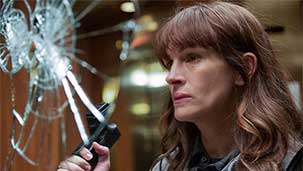You’ve made up a lot of Hollywood’s most famous faces, so I doubt that you’re ever star-struck. Still, you must get a bit of a thrill being hired to ply your craft on one of the most beautiful women in the world (even if this isn’t the first time). That is, it must have been thrilling until you read the script for The Secret in Their Eyes. Much of the movie has Julia not just glammed-down, but nearly unrecognizable.
This might seem derisive, but it certainly seems like the tired cliché of “pretty star gets drastic make-under in hopes of snagging an Oscar nom” applies here.
In fact, the whole movie feels like one big “for your consideration” promo reel.
The original 2009 Argentinian film, The Secret in Their Eyes, already won the Academy Award for Best Foreign Film, and deservedly so. It manages a delicate but assured balance between being a taut thriller, unrequited love story, and nuanced character study that haunts you long after the credits have rolled. Americanizing The Secret in Their Eyes is an idea that works better in theory than in practice. Like the folly of trying to apply makeup in a speeding car, all you end up with is a pretty mess.
The foundation is there: it’s 2003, Ray is an FBI agent sent to L.A. to work for the newly formed Department of Homeland Security. His partner is Jess, a sharp investigator and dedicated single mom. When Jess’ daughter Carolyn is discovered murdered beside a mosque the team has been investigating, Ray’s failure to bring the murderer to justice threatens to upend the Department’s operation. Twelve years later, Ray, returns to L.A., convinced he has found Carolyn’s murderer, and enlists the help of Claire, his former co-worker and unrequited love, who is now the District Attorney.
This movie looks good. Too good. The Homeland Security offices are artfully disheveled, the walls covered in boutique hotel paintings, the file boxes stacked just so; it should seem real, yet it all somehow feels as though the art department has spray cans of Hollywood Gloss with which they liberally coat each set. Even the grit feels faux. The leads, Chiwetel Ejiofor as Ray, and Nicole Kidman as Claire, are fantastic actors and even more fantastically good looking, but they share exactly zero chemistry, rendering their will-they-won’t-they subplot as translucent as your finishing powder.
Julia Roberts does stand out here—and I don’t just mean figuratively. When the film flashes back to 2003, we see the Julia Roberts audiences know and love – pretty, perky: America’s Sweetheart. When the film follows her into present day, it’s painful to see the effect the events of the film have had on her. You give her dark circles under her eyes, a sallow complexion and hollow sockets. Jess is a shell of her former self. She is hunched over and walks like a wounded animal. Robert’s performance of a long-grieving mother is heartbreaking, yes, but we’re never able to forget that it’s Julia Roberts. As anyone who rolled their eyes at the no-makeup selfie trend would know, it’s obvious when something is trying too hard to look “real.”
Writer/Director Billy Ray has had success in the past with cerebral adult thrillers, namely his work on Shattered Glass, State of Play, and Captain Phillips, all of which boasted stripped-down veracity and multi-layered characters searching for some intangible truth. None of that honesty is on display here. The dialogue tries alternately to be flip and trenchant, and often fails at both. Danny Moder’s cinematography does it’s best to operate around the bland staging, and if it wasn’t for the top-notch cast – which is rounded out by Alfred Molina, Dean Norris, and Michael Kelly – the whole thing would read as a particularly convoluted, high-pedigree police procedural.
When you were a very little girl did you ever put makeup on yourself? The lipstick ends up clownish, the eye shadow is exaggerated, and the blush is severe. Which isn’t surprising when the elements are applied with such a heavy hand. It seems the same technique was employed here: so much fuss to make something that was already beautiful less remarkable.
Sincerely,

Di







